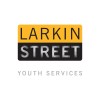
Larkin Street Youth Services
Since 1984, Larkin Street Youth Services has helped over 75,000 young people at risk of or experiencing homelessness, ages 12 to 24, through outreach, shelter, housing, health, wellness, education and employment. As the largest non-profit provider of services for young people experiencing homelessness in San Francisco, Larkin Street’s scope and impact is incomparable: three out of four young people who complete programs at Larkin Street leave street life behind.






